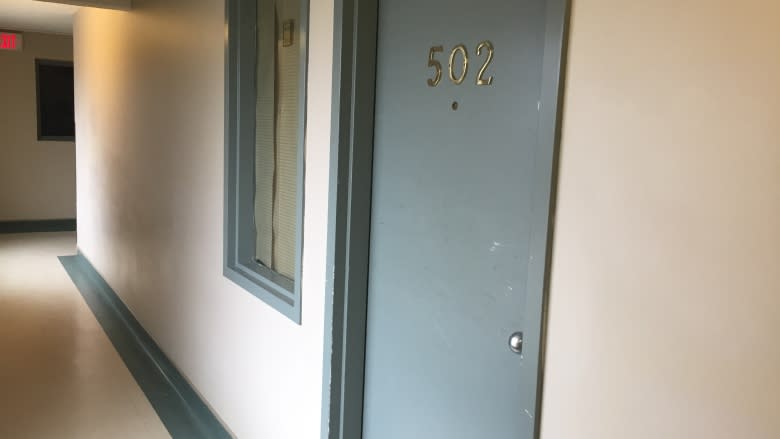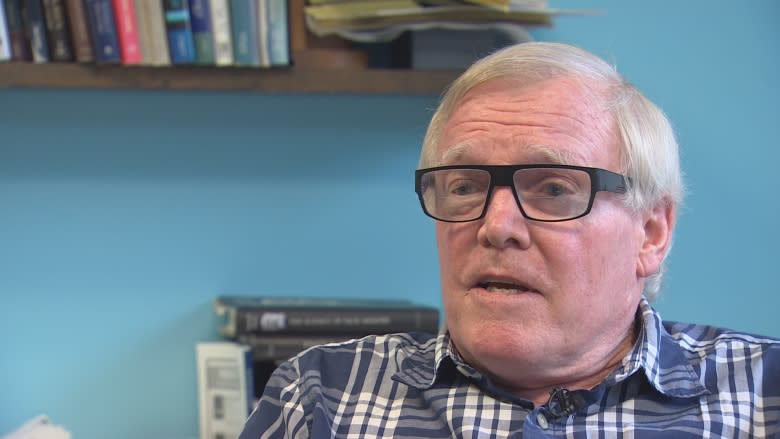Tina Fontaine's alleged killer says police fabricated evidence
The man awaiting trial for the slaying of Tina Fontaine is accusing Winnipeg police of fabricating evidence and ensnaring him in an elaborate trap.
"I didn't harm a hair on Tina Fontaine's head," Raymond Cormier said in an interview with CBC News. "There is no smoking gun. There is nothing like that. There's just a bunch of lies."
"I ended up being sucked into a 'Mr. Big' operation," said Cormier, 54. He also acknowledged he knew Fontaine and had met her on four separate occasions, including times when they drank and did drugs together.
Tina Fontaine' death became one of the most well-known cases of murdered Indigenous women in the country, at a time many were calling for a national inquiry into unsolved cases.
A "Mr. Big" sting is a controversial technique used in cases in which police typically have a suspect in mind, but don't have enough evidence to lay charges. In a Mr. Big operation, police create a fictitious criminal organization and invite the target to join. It is through this process that police try to gather more evidence and secure a confession.
Cormier alleges undercover police befriended him, paid him more than $2,000 for small errands and jobs over five months, and ultimately flew him to B.C. — all in an effort to secure a confession.
Winnipeg police declined to comment on Cormier's allegation, but in the past have said they used covert techniques in the investigation. Last December, then Deputy Chief Danny Smyth told reporters there was "some covert operation stuff going on" during Cormier's arrest, but would not elaborate.
The Crown attorney handling the case, James Ross, told CBC News: "Mr. Cormier may want to try the case in the press, but we don't.
"Take what Mr. Cormier says with a grain of salt," Ross advised.
Cormier was arrested in December 2015 and charged with second-degree murder in connection with the teen's death. Tina Fontaine's body was discovered wrapped in a duvet cover near Winnipeg's Alexander Docks, along the Red River, in August 2014.
A preliminary hearing is scheduled for next May.
Cormier is being held in segregation at the Brandon Correctional Centre, awaiting trial, but he hasn't been idle. He's parted ways with three lawyers and has filed a Law Enforcement Review Agency (LERA) complaint against the Winnipeg Police Service.
In it, he states that police engaged in a "clear and malicious act to deliberately manufacture and fabricate false evidence in an attempt to establish a link between me, the murder suspect, with Miss Tina Fontaine."
'Mr. Big' sting
Cormier told CBC News that police first questioned him about Fontaine's death sometime around the end of September 2014. A short time later, he was taken into custody because of several outstanding charges unrelated to the Tina Fontaine case. By the time he was released in the summer of 2015, Cormier believes police had already set an elaborate trap in motion.
Cormier alleges undercover police set him up in an apartment on Logan Avenue where they surveilled him and slowly befriended him. A man who lived in an apartment down the hall — "Mohammad" — hired him for small jobs. He told Cormier he worked for a powerful man named "Mr. J."
"They took me to the airport and they said 'OK, now where the luggage comes off there on that flight, there's a suitcase with a red ribbon on it. Grab it and bring it to the truck,'" Cormier said. "I figure it's dope or something, I don't know. I got paid 500 bucks."
In total, Cormier said he was paid about $2,220 to do jobs for "Mr J."
At one point in the fall of 2015, he said "Mohammad" pounded on his door and asked for help after he supposedly assaulted his girlfriend. Cormier said he was asked to help clean up blood from the suite and if he knew the best way to remove blood spatter from walls. He said he believes it was a ruse designed to see if he had any experience cleaning up evidence.
Vancouver job
When December rolled around, Cormier said he was again tapped to do a job for "Mr J." A man owed the crime boss $180,000 and needed Cormier and a few others to do "a collection." Cormier said he was told he would be paid between $7,000 and $8,000.
"Beat somebody up and take the money. OK, let's do it. OK, I'm not going to hide behind 'I was going up there to help an old lady cross the street,'" said Cormier, who has more than 92 prior convictions in four provinces.
He boarded a flight to Vancouver with four other men. "When we get to Vancouver, they take me to the restaurant there, a popular restaurant up there," he said, "They wine and dine me."
The next day, they drove to a resort in Whistler, B.C. Cormier said while the men were gathered around a table, Mohammad received a phone call from Winnipeg. The woman on the other end told the group Winnipeg police were looking for Cormier to charge him with Fontaine's death.
Cormier said Mr. J asked the others to leave the room so they could speak privately.
"He said this: 'You already admitted about killing Tina,'" Cormier said. "I said 'The hell with you, I never f--king said that to anybody ever. Never. Not once have I ever said that to anybody, what the hell are you talking about?' … Then I knew that it was cops."
'Painted the perception'
Cormier was arrested shortly after and taken back to Winnipeg. He is angry police did not explain why he was arrested out of province.
"What they did was they painted the perception in the hearts and the minds of everybody that I was the one who did it. And that I had somehow escaped to Vancouver to hide from it. That's what the perception was. I don't know how many people told me 'You went to Vancouver, what did you run away to Vancouver for?' I went to Vancouver because they brought me there," he said.
Cormier filed his LERA complaint about falsification of evidence in June.
LERA Commissioner Max Churley told CBC News he dismissed the case on the basis that it was outside of the scope of LERA's mandate, which is to investigate public complaints of police misconduct.
Cormier is appealing that decision to provincial court. In October, he appeared via videolink at a Winnipeg hearing before provincial court Judge Ryan Rolston.
At the time, Cormier said: "I've extended the complaint from beyond just the fabrication of a piece of evidence. The whole case in general is part of the whole problem that resulted in my being in the position that I'm in."
Driver's licence
A cornerstone of his argument is the allegation that undercover officers provided him with a fake Manitoba driver's licence identifying him as Sebastian Roy for the trip to Vancouver.
In his interview with CBC News, Cormier said: "The police say that Tina told her CFS worker that she was going to see a guy by the name of Sebastian. There you go. I'm not a lawyer, but that's fabricating evidence."
However, Cormier admitted to CBC he occasionally used the name Sebastian as an alias when peddling dope.
Another appeal hearing is slated for later this month.
It wasn't until 16 months after Fontaine's death that police charged Cormier with second-degree murder, even though he was a suspect early in the investigation.
Risk of false confession
York University cognitive psychologist Tim Moore, who studies how police use the controversial Mr. Big technique, said it's typically used "when they've reached a stalemate."
"In Canada, the controversy has to do with the risks of false confessions that can arise from a Mr. Big operation," Moore said.
"The U.S. doesn't use it, and in my opinion, that should be telling us something. The U.K, doesn't use it. Australia is the only other country that has used it with any frequency," Moore said.
The Mr. Big technique has come under greater scrutiny since 2014, when the Supreme Court of Canada overturned the conviction of Newfoundland man Nelson Hart for killing his twin daughters. Hart's confession to undercover officers was ruled inadmissible.
After the Hart case, the court set a higher bar for the evidence that comes from Mr. Big stings, said Osgoode Hall law professor Lisa Dufraimont.
"What the Supreme Court of Canada did in that case is they created a new rule of evidence that said that Mr. Big operations, the evidence coming out of them, would be inadmissible unless the prosecution could show that it was reliable. So the prosecution has to show reasons to think that the evidence is reliable," she said.
The Supreme Court decision came down a month prior to Fontaine's death.
Thelma Favel, Tina Fontaine's great aunt, isn't concerned about the new information.
"I have my trust in the investigators that went through all this," she said.






